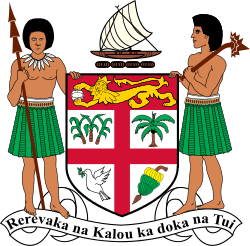Lau (Fijian Communal Constituency, Fiji)
Lau Fijian Provincial Communal is a former electoral division of Fiji, one of 23 communal constituencies reserved for indigenous Fijians. Established by the 1997 Constitution, it came into being in 1999 and was used for the parliamentary elections of 1999, 2001, and 2006. (Of the remaining 48 seats, 23 were reserved for other ethnic communities and 25, called Open Constituencies, were elected by universal suffrage). The electorate covered the Lau Islands archipelago and was coextensive with Lau Province.
 |
|---|
| This article is part of a series on the politics and government of Fiji |
|
Legislative
|
|
Judiciary
|
|
The 2013 Constitution promulgated by the Military-backed interim government abolished all constituencies and established a form of proportional representation, with the entire country voting as a single electorate.
Election results
In the following tables, the primary vote refers to first-preference votes cast. The final vote refers to the final tally after votes for low-polling candidates have been progressively redistributed to other candidates according to pre-arranged electoral agreements (see electoral fusion), which may be customized by the voters (see instant run-off voting).
1999
| Candidate | Political party | Votes | % |
| Adi Koila Nailatikau | Christian Democratic Alliance (VLV) | 3,012 | 50.82 |
| Viliame Cavubati | Soqosoqo ni Vakavulewa ni Taukei (SVT) | 2,816 | 47.51 |
| Isoa Tuinasaqalau | Nationalist Vanua Tako Lavo Party (NVTLP) | 99 | 1.67 |
| Total | 5,927 | 100.00 | |
2001
| Candidate | Political party | Votes | % |
| Laisenia Qarase | Soqosoqo Duavata ni Lewenivanua (SDL) | 5,219 | 91.48 |
| Bogivitu Lotawa | Conservative Alliance (CAMV) | 76 | 1.33 |
| Vakatoto Biu Vulivakarua | Soqosoqo ni Vakavulewa ni Taukei (SVT) | 246 | 4.31 |
| Sailosi Vulawalu Halofaki | Independent | 164 | 2.87 |
| Total | 5,705 | 100.00 | |
2006
| Candidate | Political party | Votes | % |
| Laisenia Qarase | Soqosoqo Duavata ni Lewenivanua (SDL) | 4,896 | 93.33 |
| Viliame Cavubati | National Alliance Party (NAPF) | 350 | 6.67 |
| Total | 5,246 | 100.00 | |